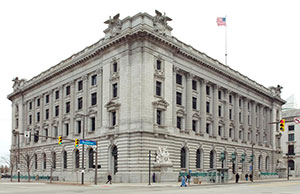Federal Courts Struggle, Remain Open During Partial Shutdown; State Court Operations Unaffected

Howard M. Metzenbaum U.S. Courthouse in Cleveland. Photo courtesy of U.S. General Services Administration; Carol M. Highsmith, photographer.

Howard M. Metzenbaum U.S. Courthouse in Cleveland. Photo courtesy of U.S. General Services Administration; Carol M. Highsmith, photographer.
The federal courts may be open during the government shutdown, but it’s far from “business as usual.” According to a Department of Justice memo (pdf), U.S. Attorneys across the country have been directed to “curtail or postpone” civil litigation “to the extent that this can be done without compromising . . . the safety of human life or the protection of property.” Criminal litigation will continue without interruption.
As a consequence, case by case, U.S. Attorneys are filing motions for stays of litigation. “Absent an appropriation,” the typical motion reads, “Department of Justice attorneys and employees are generally prohibited from working, even on a voluntary basis. . . . This is creating difficulties for the Department to perform the functions necessary to support its litigation effort.”
While the shutdown does not impact Ohio’s state court system directly, many courts across the state apply for and use federal grant money for special projects. Money allocated from the U.S. Department of Health & Human Services Court Improvement Program pays for coursework through the Ohio Supreme Court’s Judicial College and the work of the Advisory Committee on Children, Families, and the Courts, including some training. A few courts operating specialized dockets receive Department of Justice grant money. Many more local courts seek out funding from the Byrne Memorial Justice Assistance Grant, also from the Department of Justice. However, these monies have already been allocated, and these programs are not expected to be affected by the shutdown.
Around the nation, there are varying responses by federal judges to Department of Justice requests for stays because of the shutdown.
In the District of Columbia District Court, Judge Colleen Kollar-Kotelly responded to a DOJ request for a stay in litigation involving an airline merger agreement, by writing (pdf)“. . because of the need for the prompt resolution of this matter, the Court has set an expedited discovery and trial schedule. A stay at this point would undermine this schedule and delay the necessary speedy disposition of this matter.” Motion denied.
What happens in the cases where motions are denied? According to DOJ’s directive (pdf), “If a court denies a litigator’s request to postpone a case and orders it to continue, the litigation will become an excepted activity that can continue during the lapse.”
The consequences of federal funding cuts for courts outside of the ramifications of a shutdown have also been raised. The Ohio State Bar Association president joined six state bar leaders from other states to express deep concerns about the cuts to their Congressional delegations and how the cuts “imperil the federal judiciary in its efforts to carry out its duties and responsibilities as set forth in the Constitution and acts of Congress.”


